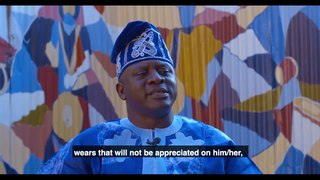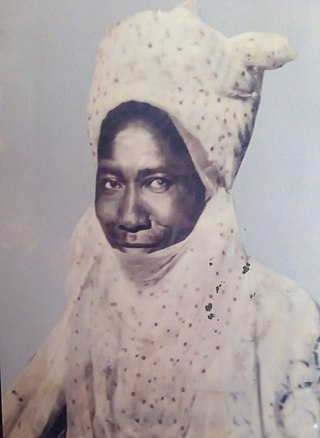Related Research Articles

Ibadan is the capital and most populous city of Oyo State, in Nigeria. It is the third-largest city by population in Nigeria after Lagos and Kano, with a total population of 2,649,000 as of 2021, and over 3 million people within its metropolitan area. It is one of the country's largest cities by geographical area. At the time of Nigeria's independence in 1960, Ibadan was the largest and most populous city in the country, and the second-most populous in Africa behind Cairo. Ibadan is ranked one of the fastest-growing cities in sub-Saharan Africa, according to the UN Human Settlements Program (2022). It is also ranked third in West Africa in the tech startups index. Ibadan joined the UNESCO Global Network of Learning Cities in 2016.

Ogbomosho is a city in Oyo State, south-western Nigeria. It was founded in the mid 17th century. The population was approximately 655,517 in 2024. It is the second largest city in Oyo State and also among the most populated in Nigeria. It is the 3rd most populated city in South Western Nigeria after Lagos and Ibadan. Although the principal inhabitants of the city are the Yoruba people, there are people from other parts of Nigeria and other West African countries who are residents in the city.

The Tijjani order is a Sufi order of Sunni Islam named after Ahmad al-Tijani. It originated in the Maghreb but now more widespread in West Africa, particularly in Senegal, Gambia, Mauritania, Mali, Guinea, Niger, Chad, Ghana, Northern and Southwestern Nigeria and some parts of Sudan. The Tijāniyyah order is also present in the states of Kerala, Tamil Nadu and Karnataka in India. Its adherents are called Tijānī. Tijānīs place great importance on culture and education and emphasize the individual adhesion of the disciple (murid). To become a member of the order, one must receive the Tijānī wird, or a sequence of holy phrases to be repeated twice daily, from a muqaddam, or representative of the order.

Osogbo is a city in Nigeria. It became the capital city of Osun State in 1991. Osogbo city seats the Headquarters of both Osogbo Local Government Area and Olorunda Local Government Area. It is some 88 kilometers by road northeast of Ibadan. It is also 108 kilometres (67 mi) by road south of Ilorin and 108 kilometres (67 mi) northwest of Akure. Osogbo shares boundaries with Ikirun, Ilesa, Ede, Egbedore, Ogbomosho and Iragbiji and it is easily accessible from any part of the state because of its central nature. It is about 48 km from Ife, 32 km from Ilesa, 46 km from Iwo, 48 km from Ikire and 46 km from Ila-Orangun; the city had a population of about 200,000 people and an approximate land area of 126 km. The postal code of the area is 230.

Ẹdẹ is a town in Osun State, southwestern Nigeria. It lies along the Osun River at a point on the railroad from Lagos, 180 kilometres (110 mi) southwest, and at the intersection of roads from Oshogbo, Ogbomosho, and Ile-Ife. The two (2) local government areas in Ẹdẹ are Ẹdẹ South and Ẹdẹ North. There are three (3) major tertiary institutions in Ẹdẹ, which makes the town one of the fastest growing towns in the south-west with an increasing literacy rate. The Federal Polytechnic Ẹdẹ, Adeleke University, and Redeemer's University are among the institutions.

Lokoja is a north-central city in Nigeria. It lies at the confluence of the Niger and Benue rivers and is the capital city of Kogi State. While the Bassa Nge, Yoruba (Oworo) and Nupe are indigenous to the area, other ethnic groups, including the Kupa-Nupe, Hausa, Ebira, Igala, Igbo, Bini/Edo, and Tiv have recently established themselves. Lokoja is projected to be the third fastest growing city on the African continent between 2020 and 2025, with a 5.93% growth rate. It was listed as a second class township by the 1917 township ordinance of the colonial administration, indicating that Lokoja is an old city.

The Nupe are an ethnic group native to North Central Nigeria. They are the dominant ethnic group in Niger State and an important minority in Kwara State. The Nupe are also present in Kogi State and The Federal Capital Territory.

Okene is a town in the Nigerian state of Kogi. The town is based in a Local Government Area of the same name. Okene runs along the A2 highway. It had an area of 328 km2 and a population of 320,260 at the 2006 census.
Ibrahim Idris is a Nigeria politician and businessman who served as the governor of Kogi State from 2003 to 2008 and from 2008 to 2012. He is a member of the Peoples Democratic Party (PDP). Idris was succeeded by his brother-in-law Captain Idris Wada, who won election in December 2011 and took office in January 2012.
The Ebira people are an ethnic-linguistic group of North central Nigeria. Most Ebira people are from Kogi State and Nasarawa State. Their language is usually classified as Nupoid and within the Benue-Congo branch of the Niger-Congo language family. Until the separation of Kogi State from Kwara State, Okene was seen as the administrative center of the Ebira-speaking people in Kogi state, located not far from the Niger-Benue confluence. Since the formation of the state, the Ebira Ta'o people are predominantly found in five local governments in Kogi state, namely Adavi, Ajaokuta, Okehi, Okene and Ogori/Magongo. They are also found in large numbers located in the Federal Capital Territory, Abuja and Nasarawa in Toto LGA. Also, the Eganyi are found in Ajaokuta LGA. And the Etuno can be found in Igarra town of Agorimagongo, Okehi and Okene each with their administrative headquarters. Ebira Koto is found in Kogi and Koton Karfe LGA, Bassa LGA, Lokoja in Kogi and Abaji LGA in the Federal Capital Territory, Akoko-Edo LGA, Edo State.
Alhaji Adamu Atta was the first civilian governor of the Nigerian Kwara State during the Second Republic, representing the National Party of Nigeria (NPN).
Ahmed Tijani Ahmed was a Nigerian politician who was Senator for the Kogi Central constituency in Kogi State from 1999 to 2003 as a member of the People's Democratic Party (PDP).
Danladi Mohammed Zakari was the first Military Administrator of Kogi State, Nigeria after it was created in August 1991 from parts of Benue and Kwara states. He held office from August 1991 until January 1992 during the military regime of General Ibrahim Babangida, handing over to the elected governor Abubakar Audu at the start of the Nigerian Third Republic.
On 7 August 2012, a mass shooting occurred at Deeper Life, an evangelical Christian church near Okene in Nigeria's central Kogi State. Three unidentified gunmen killed 19 people, including the church's pastor. The following day, in an apparent reprisal killing, three gunmen on motorcycles killed two soldiers and a civilian outside a mosque in Okene.

Alhaji Sir Muhammadu Sanusi I KBE was the Acting Governor of Northern Nigeria (1957) and Emir of Kano from 1954 to 1963. He was the eldest son of Emir Abdullahi Bayero. He was a powerful Emir that had substantial influence in the colonial Northern Nigeria. He hosted a grand durbar festival for Elizabeth II when she visited Kano in 1956. The power tussle between him and his distant cousin Sir Ahmadu Bello the Sardauna of Sokoto and accusations of financial malfeasance led to his abdication, and subsequent self-exile in Azare 1963. His grandson, Sanusi Lamido Sanusi, former Governor of the Central Bank of Nigeria reigned as Emir of Kano from 2014 to 2020, was dethroned by the state government in 2020 then reinstated on 24th May 2024 by Governor Abba Kabir Yusuf. Sanusi belonged to the reformed Tijaniyya order of Ibrahim Niass.

Sheikh Dahiru Usman OFR is a Nigerian Islamic Scholar. He is the supreme leader of the Islamic Sufi group known as the Tijaniyyah in Nigeria.
The Ahmadu Bello University (ABU) is a public research university located in Zaria, Kaduna State, Nigeria. It was opened in 1962 as the University of Northern Nigeria. The university has four colleges, three schools, 18 faculties, 110 academic departments, 17 centres, and seven institutes with over 600 professors, about 3000 academic staff and over 7000 non-teaching staff. The university has over 400 postgraduate programmes reflecting its strife to become a postgraduate studies-centred university. The university operates from two campuses in the ancient cosmopolitan city of Zaria, the Samaru Campus where the Senate Building and most of the faculties are located and the Kongo Campus, hosting the faculties of Law and Administration. It has been adjudged to be the largest university in Sub-Saharan Africa, in terms of land occupied, owing to the numerous buildings it has.

The 2023 Nigerian Senate elections in Kogi State were held on 25 February 2023, to elect the 3 federal Senators from Kogi State, one from each of the state's three senatorial districts. The elections coincided with the 2023 presidential election, as well as other elections to the Senate and elections to the House of Representatives; with state elections being held two weeks later. Primaries were held between 4 April and 9 June 2022.
Abdulrahman Ado Ibrahim was the fourth traditional ruler and Ohinoyi of Ebiraland, a traditional state with headquarters in Okene, Kogi State, Middle Belt, Nigeria. He was a son of the second attah of Ebiraland, Ibrahim Onoruoiza, of the Omadivi clan, who reigned from 1917 to 1954.
Sunday "Sunnie" Enessi Ododo, FNAL is a Nigerian professor of performance aesthetics, theatre practice and theatre technology. He is a writer and has served as the General Manager/CEO of the National Arts Theatre from 2020 to 2024. He is a Fellow of the Nigerian Academy of Letters and has served as one of its executive members.
References
- ↑ Sarki, Idris Enesi (1996). The Ohinoyi throne: towards peaceful successions. Samaru, Zaria: S. Asekome. p. 15.
- ↑ Osaghae, Eghosa E.; Ibeanu, Okechukwu; Onu, Godwin; Gaskia, Jaye; Jibo, Mvendaga; Galadima, H. S.; Isumonah, Victor; Simbine, A. T. (2001). Ethnic groups and conflicts in Nigeria. Vol. 4. Ibadan: University of Ibadan. p. 113.